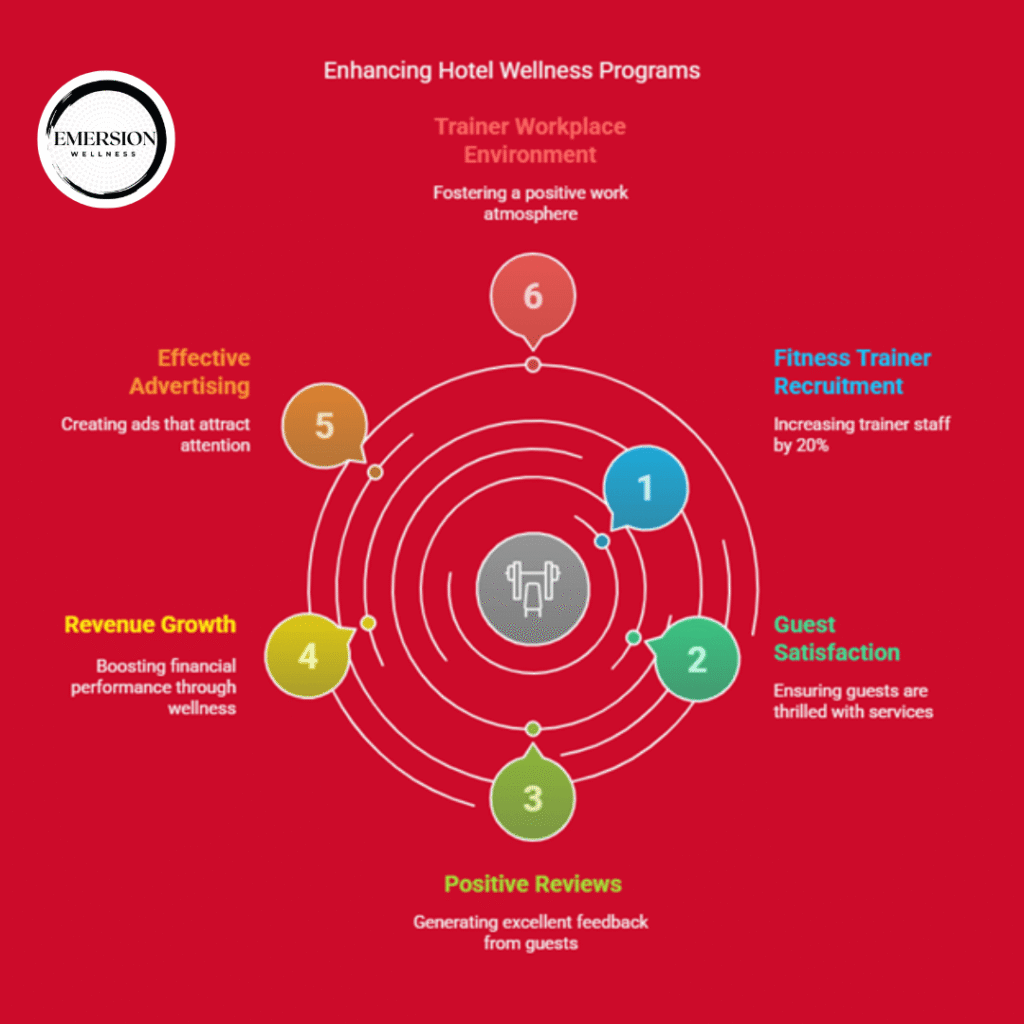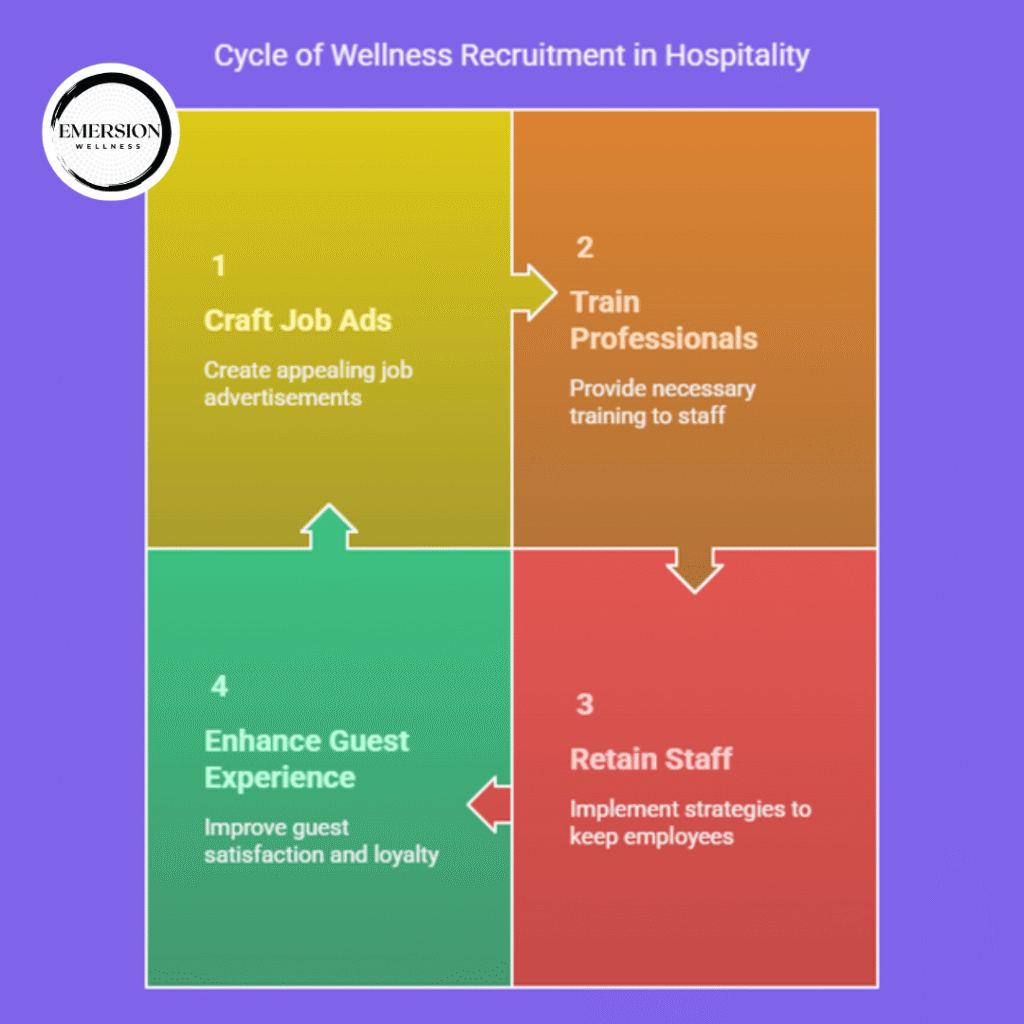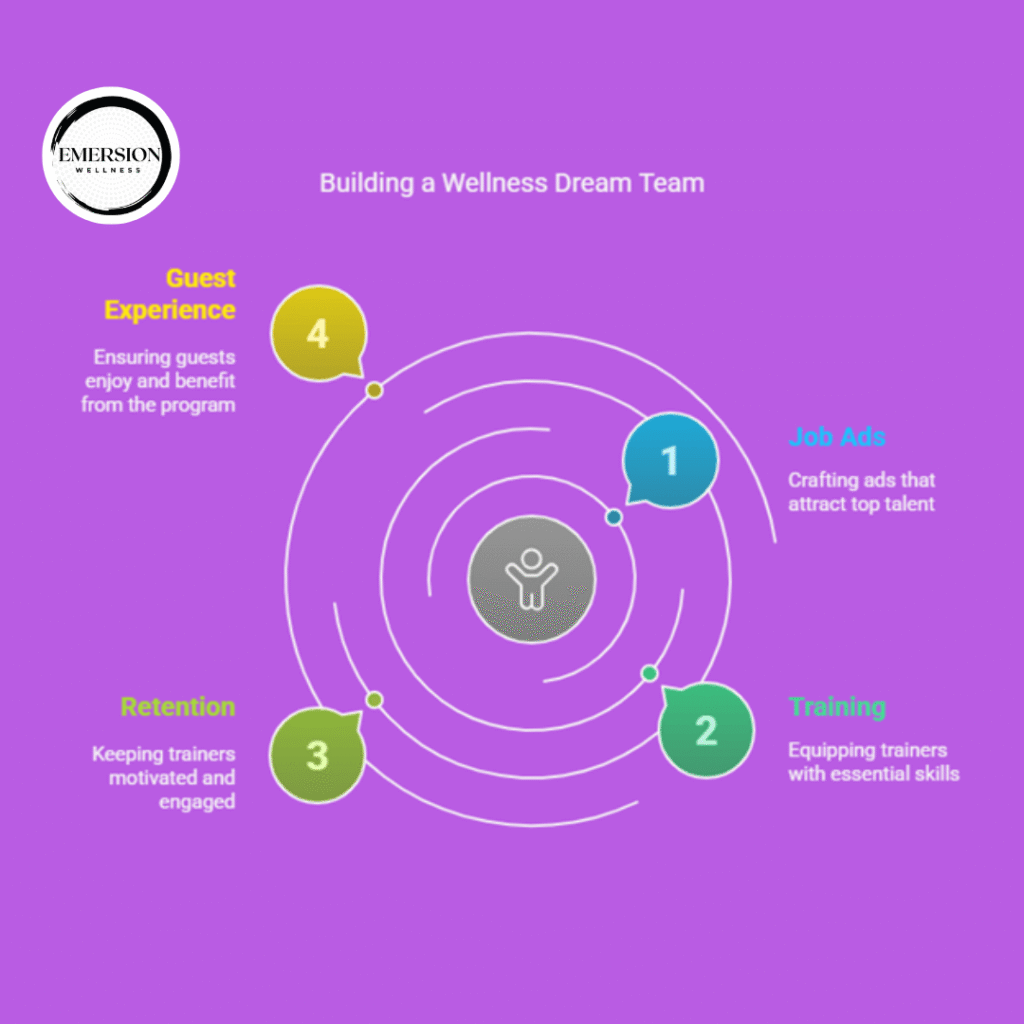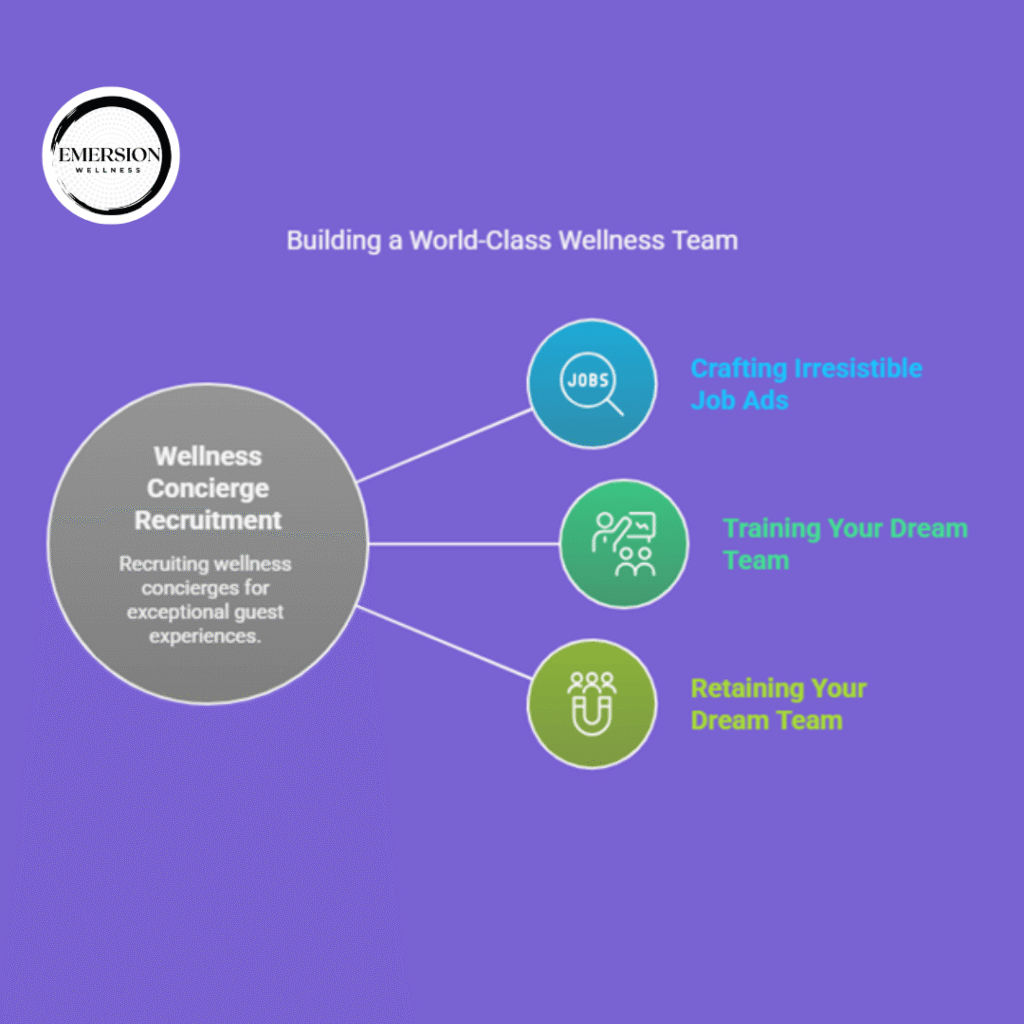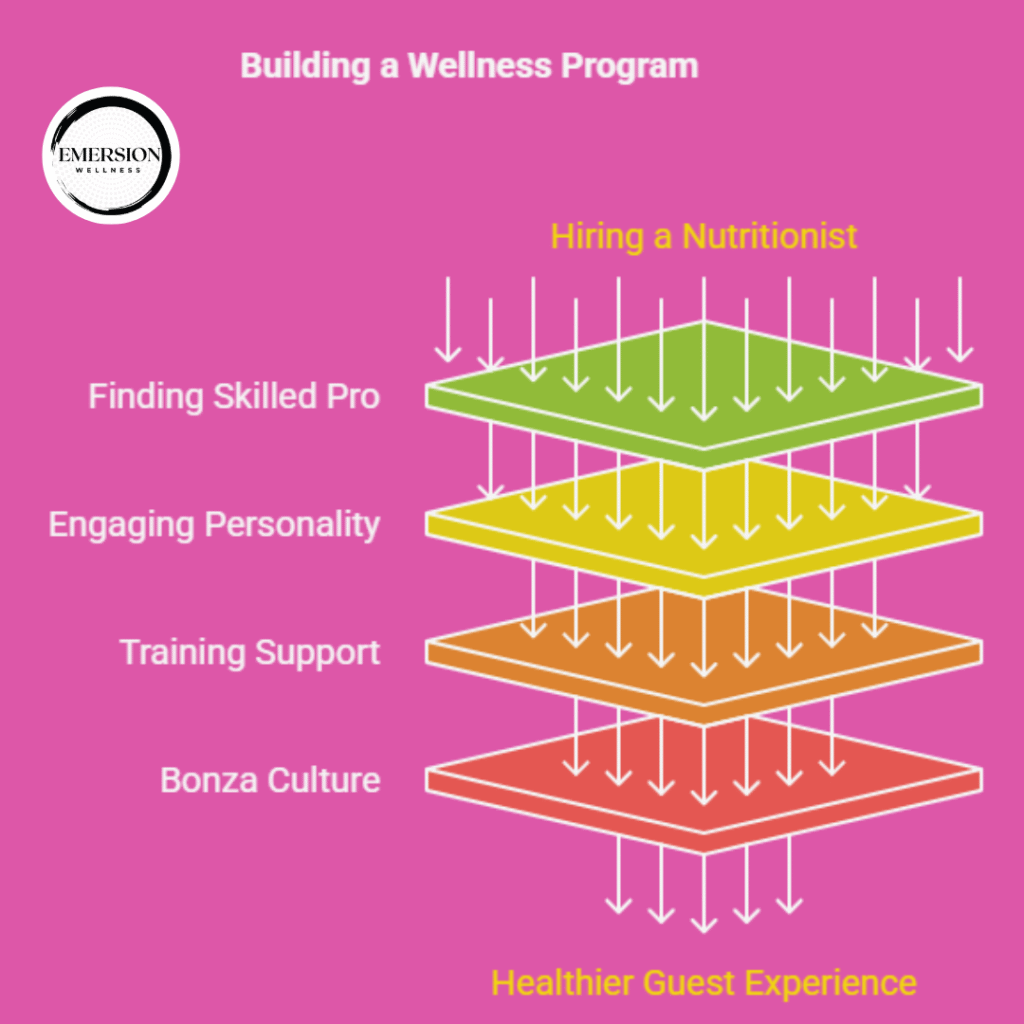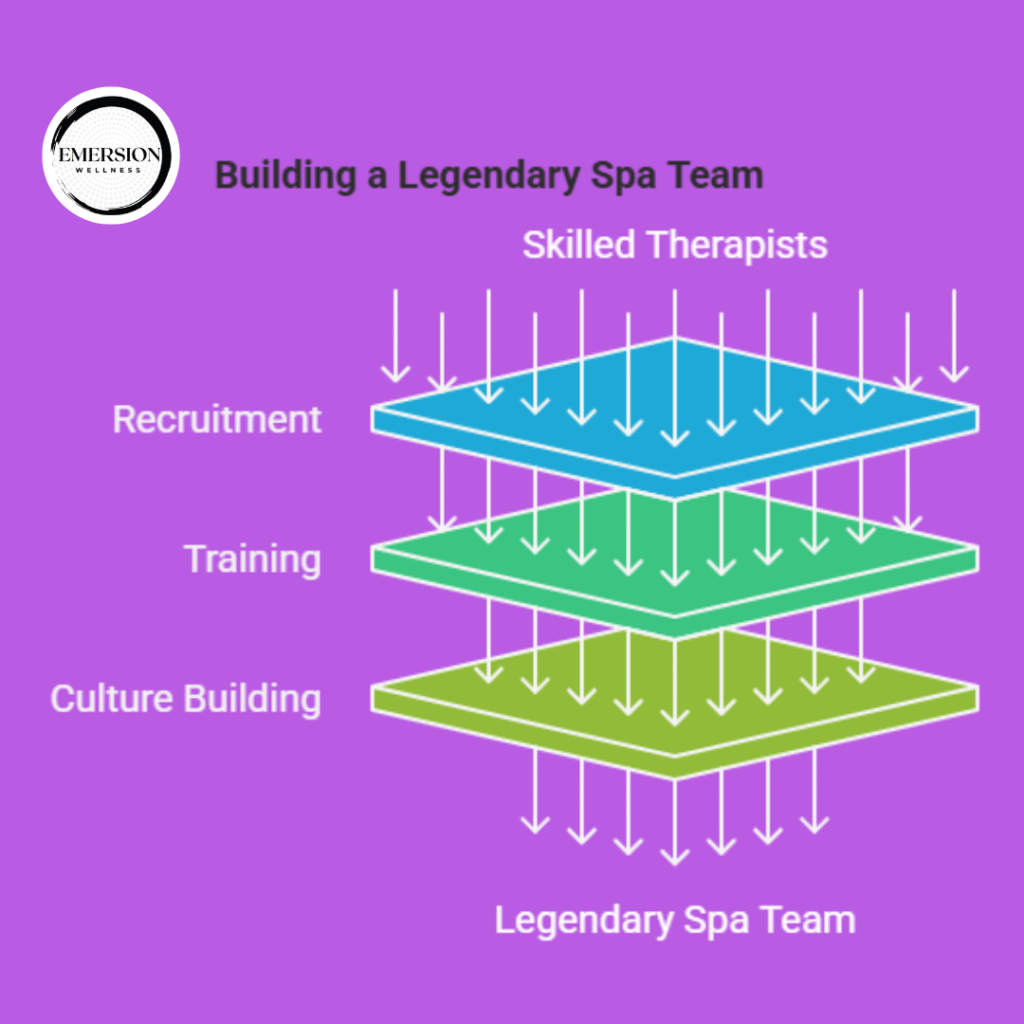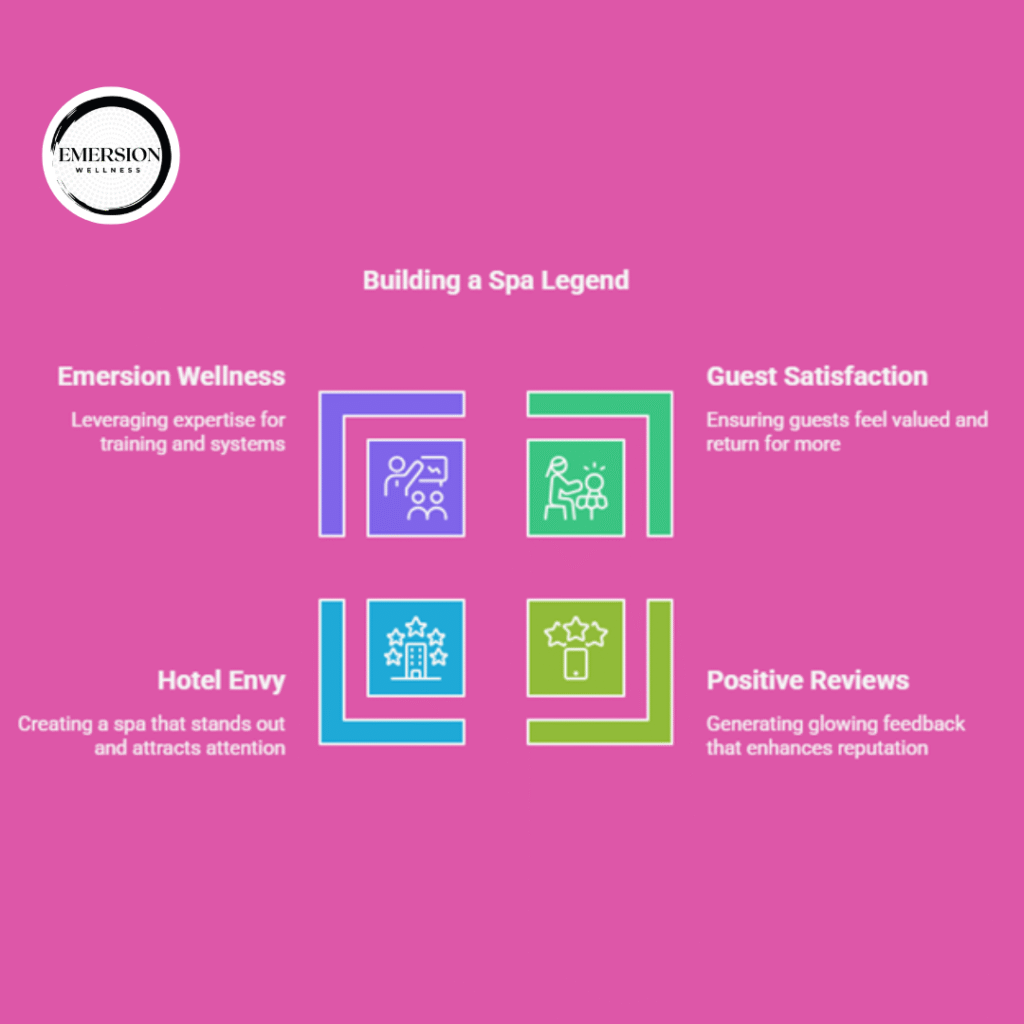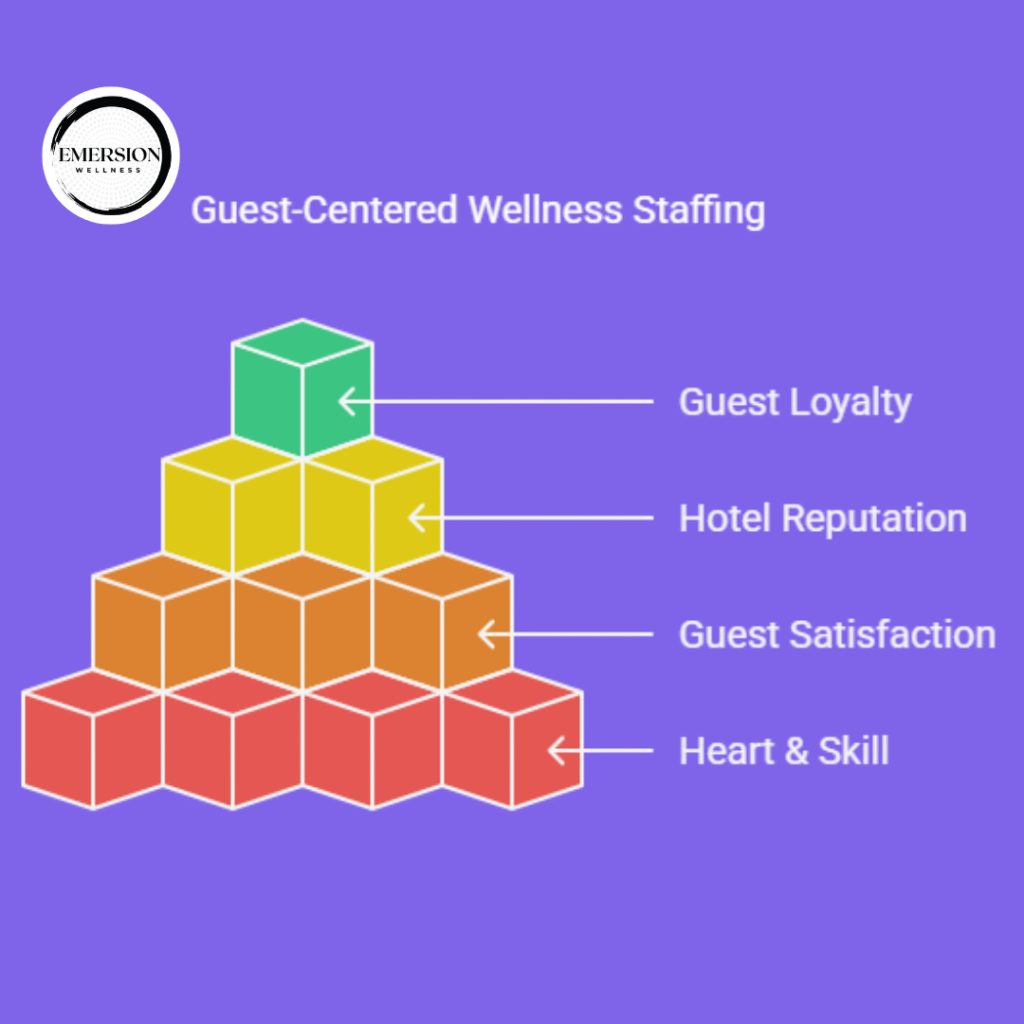How Hiring 30% More Hotel Wellness Team Members Sparks Guest Bliss
Introduction
G’day, hotel mates and wellness fans! Let’s yarn about something that’ll make your hotel the talk of the town: a top-notch hotel wellness team. Ever checked into a fancy hotel, itching for a yoga class or a massage, only to find the spa’s quieter than a ghost town? Been there. I rocked up to a ritzy resort last year, ready to chill, but one lone therapist was juggling a mob of guests. My “zen” massage felt like a race against the clock. That’s when it clicked: a cracking hotel wellness team is the secret to making guests feel like royalty and keeping your hotel’s vibe sky-high.
At Emersion Wellness, we’re all about building wellness crews that shine, and we reckon hiring 30% extra staff is the key to keeping the magic alive. So, grab a cuppa, kick back, and let’s dive into why a solid wellness team is your ticket to guest love and hotel fame!
Key Takeaways:
- A ripper hotel wellness team sparks guest raves and repeat bookings.
- Hiring 30% more staff keeps your wellness crew fresh and ready.
- A happy workplace pulls in top talent for your hotel wellness team.
- Emersion Wellness makes building your dream team a breeze at https://emersionwellness.com/.
1. Why Your Hotel Needs a Stellar Wellness Team
Your hotel’s wellness setup—spas, gyms, yoga sessions—isn’t just a bonus; it’s a guest magnet. But without a proper hotel wellness team, it’s like a barbie with no snags.
The Mess of Too Few Hands
Picture a packed weekend at your hotel. Guests swarm the spa, but your hotel wellness team is flat out. Waits drag on, treatments feel rushed, and TripAdvisor takes a hit. I once waited ages for a massage at a hotel with just one therapist on deck. Never again. A beefy wellness team keeps things smooth as.
Guests Who Can’t Stop Yapping
A well-stocked hotel wellness team can whip up a tailored yoga flow or nail a deep-tissue rub. Those moments light up five-star reviews and Instagram posts. A trainer at a hotel once fixed my dodgy squat form, and I still bang on about that place to anyone who’ll listen.
Cash in the Kitty
More wellness staff means more slots for massages, classes, or PT sessions. Hotels with a solid hotel wellness team can see wellness revenue jump by 35%. That’s dosh for fancy new saunas or a lush meditation nook.
Your Hotel’s Secret Weapon
A cracking hotel wellness team turns your place into a wellness hotspot. Guests post about their spa day, tag your hotel, and suddenly you’re the coolest spot in town. I’ve seen hotels booked solid for months because their wellness game was on point.
2. Rustling Up Your Hotel Wellness Team Like a Pro
Building a hotel wellness team is like putting together a footy squad—you need skill, heart, and a knack for making guests feel ace.
Ads That Grab ‘Em
Your job ad should feel like a mate inviting you to a barbie, not a dull form. Spruik the perks: good coin, free yoga, a fun crew. I helped a mate’s hotel write an ad so lively they got a stack of applications in a week. That’s the vibe for your hotel wellness team.
Spotting the Gems
Hunt for folks with proper creds—massage therapy, yoga teaching, or fitness certs—plus a personality that clicks with guests. I met a spa therapist once who could make you chuckle mid-facial. She was pure gold for the hotel wellness team.
Asking the Right Questions
In interviews, chuck in stuff like, “How’d you cheer up a guest who’s new to yoga?” It shows if they’ve got the heart and smarts to shine on your hotel wellness team. Empathy’s as big as skill.
Checking Their Track Record
Ring up past bosses. A quick yarn can tell you if someone’s a legend or a letdown. I skipped this once and hired a trainer who vanished after a few days. Big mistake.
3. The Magic of 30% Extra Wellness Staff
Why 30% more? It’s the sweet spot to keep your hotel wellness team ready for anything without going overboard.
Smashing Busy Times
School holidays or summer bring a flood of wellness-hungry guests. A 30% bigger hotel wellness team handles the rush without long waits or frazzled staff. I’ve seen spas turn punters away because they were short-handed—what a waste.
Keeping Burnout at Bay
Wellness gigs—massages, yoga classes—are hard yakka on body and mind. Overworked staff either quit or slip up. A 30% buffer keeps your hotel wellness team happy, fresh, and sticking around longer.
Growing Your Wellness Vibe
Extra staff let you chuck in cool stuff like sound baths or rooftop fitness classes. It’s like giving your hotel wellness team a bigger stage to strut their stuff. Guests love new options, and it keeps ‘em booking.
Building Guest Trust
A fully staffed hotel wellness team screams reliability. Guests book their spa day or class knowing they’ll get top care. That trust turns first-timers into regulars who love your wellness vibe.
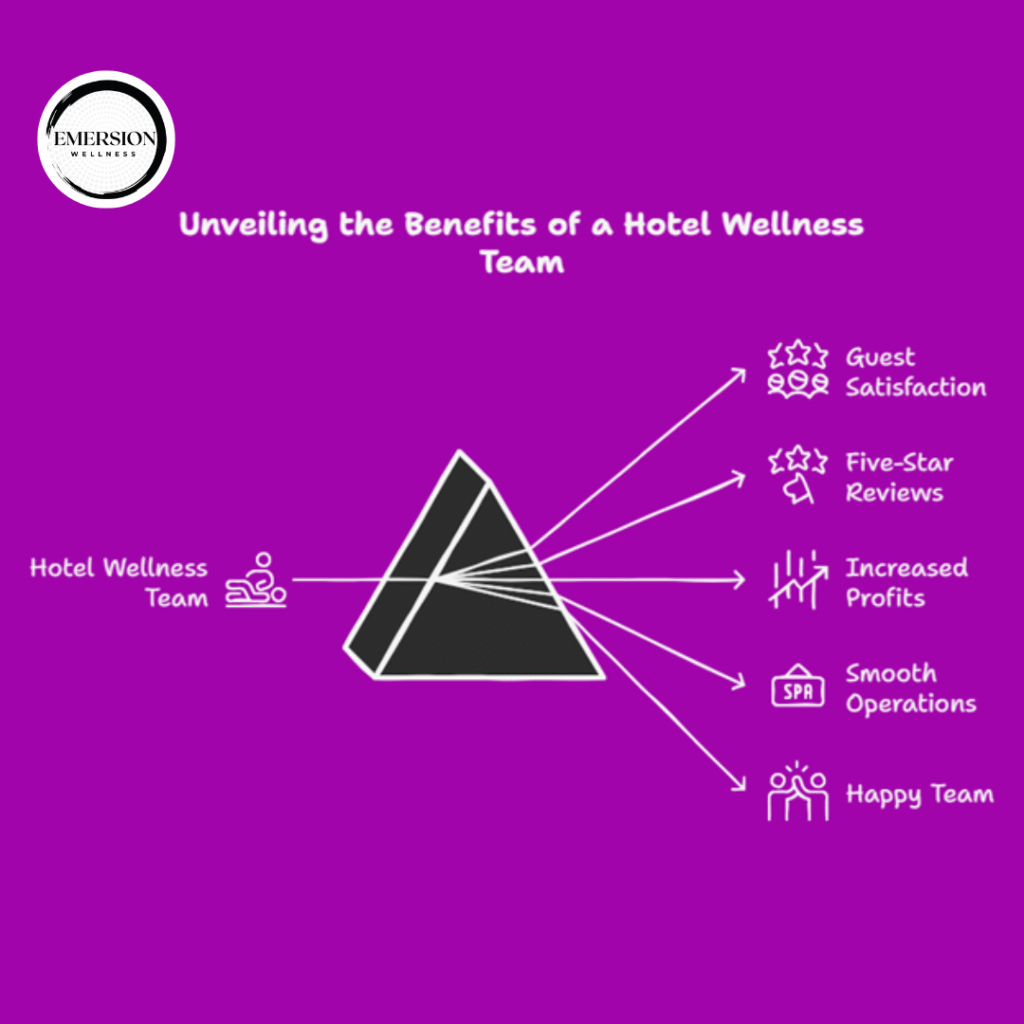
4. Making Your Wellness Team Love Their Gig
Your spa or gym should be a happy place for your hotel wellness team, not just guests. A stoked crew dishes out better service and stays put.
Perks That Light ‘Em Up
Chuck in free yoga classes, staff discounts, or a “wellness champ” shout-out. I worked at a spa once where we got free herbal teas every shift. Small thing, but it made the hotel wellness team feel ace.
Mateship Matters
Plan fun stuff—bush walks, massage swaps, or taco nights. A tight hotel wellness team creates a warm vibe guests pick up on. I’ve seen crews bond over silly fitness challenges, and it’s pure magic.
Ear On, Boss
Have regular yarns to hear their ideas. A therapist I knew suggested twilight yoga sessions, and guests went wild for it. She felt like a star on the hotel wellness team, and it showed in her work.
Room to Grow
Let staff learn new tricks, like reflexology or Pilates coaching. It keeps your hotel wellness team pumped and your offerings fresh. I did a massage course once, and it made my shifts a blast.
5. Training Your Wellness Team to Wow
Top-notch wellness pros are built with training and support. Keep your hotel wellness team sharp, and guests will notice the difference.
A Proper Welcome
Newbies need a warm start. A solid onboarding plan, like the ones Emersion Wellness whips up, shows your hotel wellness team the ropes—booking systems, guest banter, the lot. It’s like handing ‘em a map to success.
Keeping Skills Fresh
Run workshops every few months on stuff like mindfulness or hot stone massage. It keeps your hotel wellness team excited and your program bang-on-trend. I learned a new facial technique once, and it was a game-changer.
Creds That Shine
Push staff to grab certs in niches like prenatal yoga or sports massage. Guests trust those qualifications, and it gives your hotel wellness team a pro edge that stands out.
Jack-of-All-Trades
Train your hotel wellness team to dabble in a bit of everything—massage, yoga, maybe some fitness coaching. It lets you offer more without a massive crew, saving coin while keeping things fun.
6. Emersion Wellness: Your Wellness Team Mate
Rustling up a hotel wellness team can feel like herding cats. Emersion Wellness swoops in to make it smooth, fun, and dead-set effective.
Hiring Without the Headache
Emersion sends pre-vetted pros who vibe with your hotel’s style. No wading through dodgy resumes—just talent ready to join your hotel wellness team. It’s like getting a hand-picked playlist for hiring.
Plans That Fit Like a Glove
Every hotel’s different. Emersion tailors hiring for your hotel wellness team, whether you’re a swanky resort or a cozy inn. It’s like a custom-made smoothie, blended just for you.
Beyond Just Hires
Emersion doesn’t stop at recruitment. They dish out training and tips to make your hotel wellness team thrive. A mate’s hotel saw spa bookings soar 50% after Emersion’s help.
Saving Your Budget
By nailing recruitment, Emersion cuts bad hires and empty slots. Your hotel wellness team stays full, guests stay chuffed, and your wallet breathes a sigh of relief.
Conclusion: Turn Your Hotel into a Wellness Wonderland
A ripper hotel wellness team is your hotel’s golden ticket to wowing guests, stacking five-star reviews, and raking in the profits. Hiring 30% extra wellness pros ensures your spa, gym, and classes hum along like a well-oiled machine, with a crew that’s stoked and guests who can’t get enough. From ads that sing to a workplace that feels like a party, every step builds a wellness program that’s the bee’s knees.
Ready to make your hotel a wellness paradise? Nip over to https://emersionwellness.com/ for a hotel wellness team that’ll make your guests swoon. Your hotel’s about to be the hottest spot in town!
FAQs
1. Why’s a hotel wellness team so important?
A hotel wellness team is the heartbeat of your wellness program, dishing out spa treatments, fitness classes, and yoga that keep guests grinning. Too few staff means long waits, rushed service, and cranky punters. A solid wellness team boosts guest love, sparks reviews, and can drive up to 35% of your revenue through wellness bookings. It also keeps staff happy, saving you from endless rehiring.
2. How do I pull in top wellness pros?
Write a job ad that’s as warm as a sauna—spruik good pay, free classes, and a fun crew. Make your workplace a joy with perks like flexible shifts. In interviews, look for certs and a vibe that clicks with guests. That’s how you build a hotel wellness team that shines.
3. What’s the perk of hiring 30% more wellness staff?
A 30% bigger hotel wellness team handles busy seasons, dodges burnout, and lets you add cool stuff like meditation classes. Guests get quick, quality care, which builds loyalty. Staff stay happy with lighter loads, cutting turnover. It’s a smart move to boost revenue and guest trust.
4. How do I keep my hotel wellness team pumped?
Keep your hotel wellness team stoked with perks like free yoga, discounts, or a “wellness star” shout-out. Plan fun stuff—hikes or massage swaps. Listen to their ideas; maybe they suggest a class that’s a hit. Offer training to keep things fresh. A happy wellness team makes guests feel the love.
5. What skills does a hotel wellness team need?
A cracking hotel wellness team needs certs in massage, yoga, or fitness, plus a warm vibe to connect with guests. They should handle tricky moments—like calming a nervous punter—with ease. Personal touches, like remembering a guest’s fave scent, make a big difference. Skill and heart are the winning combo.
6. How does Emersion Wellness help with a hotel wellness team?
Emersion Wellness makes hiring a hotel wellness team a doddle by sending pre-screened pros who fit your hotel’s vibe. They tailor plans for your spa or gym, big or small. They also offer training and support to keep your wellness team thriving. Their know-how saves time and ensures a team that wows.
7. How can my wellness program stand out?
Staff your hotel wellness team to offer quick, personal services. Add unique touches like rooftop yoga or lavender massages. Create a cozy vibe with soft tunes, plush robes, or free teas. A great wellness team and a special atmosphere make your program a guest must-do.
8. What’s the worst hiring mistake to dodge?
Rushing the hire. Sloppy picks lead to duds who tank service or bail quick. Vague ads that don’t show your hotel’s spark also flop. Take time to find pros who vibe with your hotel wellness team, and lean on Emsion Wellness to avoid costly stuff-ups.
9. How often should I train my hotel wellness team?
Kick off with a solid onboarding to set your hotel wellness team up right. Run training every 3-6 months on trends like sound therapy or Pilates. Push for certs in niches like sports massage. Regular training keeps your wellness team pumped and your program fresh, delighting guests.
10. Why sink cash into a hotel wellness team?
Investing in a hotel wellness team is investing in guest joy and profit. A great team delivers moments that spark reviews and repeat visits. Wellness programs can pull in big bucks, making staffing a no-brainer. With Emersion Wellness, you get a team that makes your hotel a wellness legend.

I'm Nathan Baws, a nutrition nerd, exercise and weight loss expert, and an unwavering advocate for good health. As the founder of Emersion Wellness, I'm passionate about crafting Seamless Weight Loss Programs to supercharge hotel revenue and transform lives. We've pioneered the World's First Plug & Play Weight Loss Programs for top hotels and resorts, sparking a wellness revolution. Beyond my professional journey, you'll often find me hiking, swimming, and riding the waves, embracing every moment in nature. Join me on this exhilarating journey towards diet, health and wellness.
